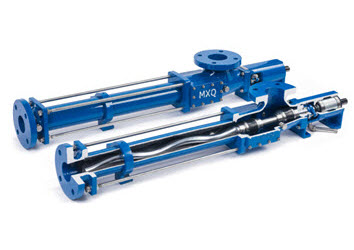Progressive cavity pumps have been one of the regular choices for wastewater treatment industries. These pumps are designed for transporting abrasive and highly viscous fluids in wastewater streams. Thus, the unique designs of these pumps make them ideal for pumping thickened liquids such as waste activated sludge. At times, sludge contains pump clogging matter such as fibers, large solids, and rags, which may settle in digesters and form masses that cannot be processed by the PC pump. These wastewater streams may also contain solid waste material such as small rocks that may damage the pump’s stator or rotor. Fortunately, a Texas-based governmental entity have discovered an effective solution with MXQ’s progressive cavity pump. What were the unique challenges faced by the governmental entity? How MXQ’s progressive cavity pumps helped alleviate their challenges? Read the post to find answers.
An Overview of Wastewater Treatment Challenges Faced by Texas Based Governmental Entity
The customer is a leading governmental entity that processes wastewater from petrochemical industries and municipalities. The client was using a piston-pump system, which is a type of progressive cavity pump. They were regularly facing the following problems with the pump:
- The pump had constant ball-valve leakage and seal failure problems.
- The solids in wastewater streams were getting trapped in digesters and causing failures. Thus, the pumps required maintenance up to 3-4 times in a year.
Owing to these challenges, the client was looking for a more reliable replacement, which is flexible enough to pump sludge from 30 to 300 GPM at a constant 85 PSI and requires less maintenance. Also, they wanted this solution to fit into a small space.
MXQ’s Progressive Cavity Pumps— Why They Make a Potential Solution
Being one of the leading providers of progressive cavity pumps in the US, MXQ stocks an inventory of Bornemann, Netzsch, and Moyno equivalent pumps. Among these, MXQ’s EH model of Bornemann Equivalent pumps was identified as the perfect fit based on the client’s requirements. The following features of these pumps have contributed to their easy acceptance in the industry.
- These pumps have an elongated profile, and are designed to pump low to highly viscous media in wastewater streams. It has the capability of pumping highly acidic media, as well as wastewater sludge.
- The pump comes with standard two universal Cardan joints, which can effectively distribute axial and radial forces. This distribution enables a longer service life and better angularity.
- These pumps are compatible with any type of driver, and possess a capacity of up to 1,400 GPM.
- The pumps can withstand differential pressures up to 360 PSI and operating temperatures up to 360 °F.
The experts at MXQ worked closely with the client team to understand their challenges and customized the pump solution to meet their specific requirement. The following changes were made to the original design:
- There was an ample space overhead, thus a belt-driven over and under design was suggested. This design change helped minimize structural changes. Also, it helped reduce the use of pipes.
- The pump was mounted on a steel base plate, and equipped with an overhead mounted 25 horsepower SEW motor.
- A variable frequency drive was added to improve the speed of the pump, as this will help the user set the pump at the desired speed.
- The pump design was made valve-free.
All these design changes helped improve the efficiency of the pump. After a period of six months, a standby pump was added to the plant. The client has benefited from cost-effectiveness, low maintenance, as well as performance-driven design. Also, it has helped them minimize maintenance time, and invest the time and effort in other productive tasks.
Through years of rigorous evaluations and adaptations, Bornemann equivalent EH model progressive cavity pumps have been developed to eliminate all the drawbacks of regular progressive cavity pumps used for wastewater applications. These pumps are designed for user convenience and efficient performance in an environment where they may be subjected to harsh contents. Owing to their unique features, these pumps are regularly employed by industries such as paper and pulp, paint, crude oil, food and beverage waste, slurry, chemical injection, drilling fluids, ballast water, calcium carbonate, and tall oil.


